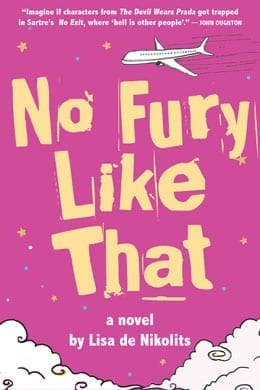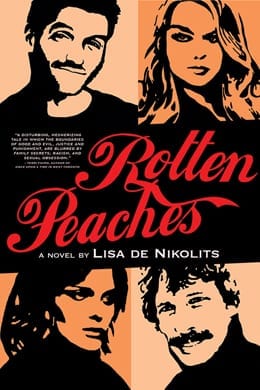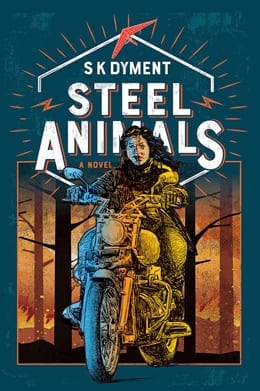-
World Italian language rights sold to Le Edizioni Assassine, Milan, Italy
No Fury Like That is a one-of-a kind literary thriller about life and death and the power of second chances. The novel takes you on a fast-paced, funny, adventurous ride, exploring love, the meaning of life, friendship, revenge, family and the transformation of a character under trying circumstance. No Fury Like That is about how a person can change and grow, and how different things will come to mean more than others; friendship is more important than success, love is more important than money and family is more important than power.
Julia Redner has to die before she can find these things out for herself – but is she really dead or is she being given the opportunity to rethink her life and solve an intricate puzzle of murders?
“Imagine if characters from The Devil Wears Prada got trapped in Sartre’s play No Exit, where “hell is other people.” No Fury Like Thatuses the lens of female souls stuck in purgatory to examine loss, love, rage, angst, and what there really is to live for. Alternately funny, melancholy, philosophical, and raunchy, it’s a wild ride and another gutsy novel from de Nikolits.”
— John Oughton, author of Death by Triangulation
“Suspenseful, surprising, thrilling and at times laugh-out-loud funny, No Fury Like That takes you on page-turning ride into another world—with Lisa de Nikolits’s skillful writing keeping you belted in.”
—Jacqueline Kovacs, Magazine Editor, Metroland Media
“Julia Redner seemed to have it all: stunning good looks, fantastic job, and enough money and perks to live in the style she’d grown accustomed to. But after it all went down and she finds herself in the afterlife, Julia realizes that she didn’t have a single friend and now has a whack of unfinished business to settle. No Fury Like That is a cautionary tale about the perils of rising to the top at any cost. It’s also a smart, satisfying read that’s laced with humour, peopled with quirky characters and moves along at a fast clip. Readers will root for its plucky heroine, hoping she’ll get a shot at a second chance. Another spellbinder from Lisa de Nikolits!”
—Rosemary McCracken, author of the Pat Tierney mysteries
“Afraid to die? Worse is yet to come! Julia, a ruthless business woman, suddenly finds herself in a Purgatory not remembering if she has died, or how. Left with no choice but to make friends with other lost souls, she never dreams she will become not only their saviour but also an avenger. In this brilliantly written book, you will be a holding your breath when Julia realises she should have made things right at the primary crime scene where it all started—Earth.”
—Suzana Tratnik, author of Games with Greta
“No Fury Like That is de Nikolits at her best. She has taken the question, “What if you had a second chance?” and has given her imagination free rein to answer it. The result is a novel full of colourful characters who grapple with their lives, their deaths, and what it is to be human. By the final page the reader has not only witnessed Julia Redner’s metamorphic journey, but has also taken a personal step forward.”
—Liz Bugg, author of the Calli Barnow Mystery Series
“Lisa de Nikolits is one of my most fascinating discoveries of Canadian literature. Her writing is fresh and attractive, but deep in ideas and thoughtful provoking. No Fury Like That is an example of this duality: under the appearance of a paranormal story set in the Purgatory we face a brilliant psychological exploration of human soul questioning our certitudes about the world: Who we really are? How to find a responsibility about our past? What are the implications of our acts? Big questions presented through a captivating prose displayed in a perfect plot that catch the reader from the very beginning. De Nikolits knows how to combine the oppressive atmosphere of Beckett or Kafka with the contemporaneous forms of thriller-narrative, always with a touch of humor and sensibility. And of course, with an extraordinary capacity to capture the essence of human emotions.”
—Miguel Angel Hernandez, author of Escape Attempt
“Settling in? Great! So, Julia, what do you think brings you here?”
I look at him. “What do you mean?” I slur, fearful that an obscenity will fly out if I open my mouth any wider.
“To Purgatory. Why not Hell? Why not Heaven? Why to this place of in-between? You don’t strike me as an in-betweener.”
“I’m not,” I mumble. “I don’t know what I’m doing here.”
“Hmmm.” He is seated in a grey wingback chair, wearing his beige corduroy trousers and his expression is earnest. His close-set eyes peer at me, his hands are clasped and his feathers are aflutter. “You don’t remember anything before you achieved consciousness in Purgatory?”
I shake my head. “Where’s my husband?” I ask.
Cedar shakes his head. “I can’t tell you.”
“But you do know.”
He nods. “But it’s vital that you remember on your own. I can’t impede your progress.” He falls silent and leans back in his chair, his hands steepled in prayer.
“How about we do a little exercise?” he asks. “I’m going to encourage you to open your mind, close your eyes, and listen to my breathing guidance. Can you do that?”
I nod, still not trusting myself to say anything.
“Close your eyes, breathe in for the count of five. Hold for five and out for five. I’ll guide you.”
We do this for a while and I start to feel sleepy.
“What do you remember, Julia?” he asks softly. “Before you came here, what do you remember? Were you making a cup of tea? Were you on the telephone to your mother? Were you stroking your kitty cat?”
My eyes fly open. Cat? “I had a cat?”
“Concentrate, Julia. Let’s start again.”
I sigh. In for five, hold, out for five.
The image of a cat comes to my mind. I see a large, incredibly grumpy, beautifully ugly cat with a squashed face and a pug nose. An immensely hairy, immensely fat, immensely angry cat. I can’t keep my eyes shut. “Cat. Oh.”
I get up and pace around the room.
Cedar doesn’t say anything, he just watches me.
I fold my arms across my chest. “Yes,” I say. “A cat.”
Before I can stop myself, tears are pouring down my face.
“Lady Marmalade. But I called him Duchess. He was my baby. My joy. I got him from a pet store. I swore I’d never buy from them, such a rip-off, you know, and pet store animals are all demented or deformed in some way. Too much inbreeding or something or they keep them in cages too long. But I was in a mall and I walked past him and he meowed at me and I stopped and I couldn’t help myself. I got them to take him out of his cage and he climbed up my shirt, and I paid two thousand dollars for a kitten, right then and there.”
By now, my nose is running and Cedar gets up and hands me a box of Kleenex.
I grab a fistful, blow my nose and continue.
“But he was demented, of course he was. He peed everywhere. He’d go right in front of me, on the carpets. He’d saunter into the room, give me a filthy look, and pee. But what could I do? I loved him. So I cleaned up after him or, I tried to. He peed in places I couldn’t find until I discovered wiring and cables had been eaten away by his puddles. He could have started a fire or something.”
“I took him to the vet, and we put him on drugs and they helped, we drugged the shit, oh sorry Cedar—” I look at him, my face wet with tears and I stand there, waiting to be bounced out the room but Cedar just nods and I carry on.
“And it helped, it lessened the problem. And he was my baby, my buddy, my friend, for nine and a half years, and then he got sick; his liver started to give out. I tried everything. I took him to homeopathy. I must have spent thousands of dollars on him, maybe even tens of thousands, I’m not exaggerating, but in the end, oh, in the end, nothing helped.”
I sink down next to Cedar, sobbing. I am shaking and howling in a way I’ve never cried before. “He died. I held him and he died. His heavy, grumpy, angry body just gave out. One minute he was purring, and the next, he left me. He got light as a feather and I didn’t know where his weight went, but I knew it was his anger and it was gone. And his anger was like my anger, and my anger is what grounds me. Without it, I too would be nothing and I’d float away, and I still miss him so much.”
I am wailing and Cedar is rubbing my back like I’m a baby and I don’t care. Snot runs down my face and I cry like my heart is broken. And just when I think I can’t cry any more, I start all over again, wailing that ungodly sound and Cedar sits there patiently, rubbing me.
Finally, I get to hiccupping. “I loved him so much,” I say. “There wasn’t a day I didn’t miss him. I had him cremated and I have an urn and I talk to him every day. I ask him why he left me. I know that sounds stupid but I do. I talk to him every day, so if you’re asking me if I was talking to my kitty cat before I came here, yes, I most likely was. He was the only friend I could rely on in this world.”
“But he left you,” Cedar points out.
“He did,” I wail. “Why? He wasn’t even ten years old. Didn’t he love me? Didn’t I make him happy? I tried so hard.”
I start to cry again.
“This is excellent progress,” Cedar says and hands me the box of Kleenex. I blow my nose again. I am exhausted.
”We’ve done enough for the day. What you should do now,” Cedar says kindly, “is have a lie-down in the Rest Room. Would you like me to walk you there?”
I nod. “Yes, please.”
I get up and touch my swollen face. “I don’t want anybody to see me like this,” I say, and Cedar laughs.
“You are so concerned with all the wrong things. But don’t worry, we won’t bump into anyone. I can arrange that.”
I don’t ask him what he means. I let him lead me down the corridor, past several doors until he finally opens the door to the Rest Room. He guides me through the foyer and into an enclosed circled curtain and I lie down and he rubs my back.
I start crying again. And this time, I am not even sure what for.









inannaadmin –
No Fury Like That by Lisa de Nikolits
reviewed by Gerilee McBride
subTerrain Magazine – January 2018
Julia Redner wakes up through a haze of pain to find herself in an airport. She’s dead, and the hangar-type structure is purgatory. It’s a nice idea—the airport as waiting room. Julia’s waiting room is about as fun as an actual airport too; with a maze of doorways, never-ending hallways, and a maniacal buggy driver. Julia hasn’t been the best person during her time on Earth and is in a holding pattern in purgatory while she figures out how to navigate her new way of being. While there, she’s shuttled through the ins-and-outs by her “Introducer” Agnes, and meets a diverse group of women who become her “New Crew.” The coffee klatch acts as a support system for Julia as she works through her emotional pain via the discovery and telling of each woman’s origin story. It’s a capricious whodunit as Julia attempts to discover why she’s there and if there’s any point in trying to get out.
We’re supposed to dislike Julia (for her beauty, her height, her overwhelming selfishness), but I find it hard not to like her. She gets all the best lines. And while she does get penalized for swearing in front of her therapist (yes, purgatory has counseling), Julia doesn’t really do anything so bad-ass to warrant true feelings of enmity from the reader. The lightness of Julia’s character makes it too easy to empathize with her and ultimately undermines her transformation from a hated Devil Wears Prada type boss to Kill Bill’s The Bride, making her journey feel less momentous then it needs to be.
Despite the soft-pedalling of Julia’s character, the story runs at an action-packed pace that is enjoyable to read, with compelling secondary characters (I want to know more about credibility-challenged Fat Tracey), and a satisfying ending—I’m not sure if we should be cheering for Julia, but I know that at least her actions are unambiguous.
I had to Google “purgatory.” Not because I don’t know what it is but because I wanted a bigger picture of what my lapsed Catholic upbringing has given me. For example, I remember as a small child learning more about limbo than purgatory, but maybe limbo is an easier concept to understand than the state of purgatory? But then again, I always think of Hieronymus Bosch’s painting “The Garden of Earthly Delights” as being an excellent example of purgatory, and that is one highly symbolic triptych. In No Fury Like That, Lisa de Nikolits gives us a version of purgatory that, while a little less grievous than Bosch’s work , is no less captivating.
inannaadmin –
No Fury Like That by Lisa de Nikolits
reviewed by Anna Killen
Beach Metro – November 28, 2017
When we first meet the protagonist of local author Lisa de Nikolits’ latest novel, No Fury Like That, she’s groggy, uncomfortable, unkempt—and missing her husband, in the middle of what appears to be a bustling, bizarre airport lounge. But things are not as they appear. As the world—Purgatory, as it turns out—reveals itself to Julia, so her character is revealed to the reader, a character which, for all of her sass, stubbornness and selfishness, is actually somewhat lovable. She grows even more so as the page-turner drives along and we are wittingly bounced around the rich, twisted world, both in the afterlife and back on earth, created by de Nikolits. At once philosophical and sartorial (there’s a Satre pun there, but we’re not going to print it), de Nikolits says this book is about revenge, and while that’s certainly on the menu, that’s not all there is to eat.
The Nearly Girl writer wrote this book as a way to channel the anger she felt after she was fired from a job she’d held for six years—budget cuts—and the book is a testament to the idea that great things can grow from the ashes, if they are nurtured just so. In the credits, de Nikolits thanks her writing groups, including the local group Mesdames of Mayhem, for their edits and support while writing this novel, and it’s easy to see the influence of female empowerment and encouragement in this refreshing read.
inannaadmin –
No Fury Like That by Lisa de Nikolits
reviewed by Ava Baccari
Hello! Magazine – October 12 2017
Julia never thought of herself as an in-betweener until she wakes up one day in purgatory. Her life on earth was built on extremes — money, power, an affair with the CEO at her ad agency. As she tried to piece together her not-so-fond memories, she finds refuge in a host of characters who help her navigate this strange place between heaven and hell, and from her heightened perspective, see where she went wrong. In this playful tome, the Toronto author explores an afterlife that isn’t surrounded by pearly gates but instead ripe with second chances.
inannaadmin –
No Fury Like That by Lisa de Nikolits
reviewed by James Fisher, The Miramichi Reader – January 2017
“Each of us is a seeker, walking along Eternity’s Road, which has no beginning and no end.”
—Sri Chinmoy
An apt quote to begin a review concerning a book that deals with aspects of eternity, and whatever your belief (or beliefs) are, you may have to suspend them temporarily to fully enjoy this new offering from Lisa de Nikolits, author of 2016’s The Nearly Girl (Inanna) as well as the award-winning Between the Cracks She Fell (2015, Inanna).
Julia Redner gradually awakens to find herself in a nondescript airport with a bunch of people standing around. Did she fall asleep at the airport? No, for she is only dressed in her go-to couch potato outfit with nothing on her feet. Only those cannot be her feet, for they are in desperate need of a pedicure! She soon discovers that this is actually Purgatory, this isn’t a dream! But how did she die?
Purgatory (in Ms. de Nikolits’ view) is a large, impersonal space with unmarked doors leading into different rooms. Some are restrooms (for sleeping), rooms for activities like lawn bowling, knitting, exercise and so on. How one remembers all this is beyond Julia. Agnes, her multi-pierced Goth “Introducer” tells her:
“I’m just here to give you the guided tour; How Purgatory Works 101, for Dummies.”
“This is Purgatory?”
“It’s no island cruise, I’ll tell you that much.”
Julia, a self-described “bitch” in her earthly existence (a la Miranda Priestly in “The Devil Wears Prada”) is compelled to associate and interact with her fellow “Purgatorians” in ways she would have considered beneath her in her daily life. Here in Purgatory, all are equal (since everyone is dead and doesn’t own a thing, there is no materialism or wasteful consumerism), there are no class distinctions and it really is one large group therapy session. As each member of the group relates how they died (some are suicides, others are overdoses) and by listening and being supportive, Julia is slowly transformed into a more selfless individual, aided by various helpers such as the aged hippie Cedar Mountain Eagle and Über-dyke Beatrice with whom Julia strikes up a Scrabble-based friendship.
Julia’s death (or, actually a near-death) experience came at the hands of her ex-lover Junior, the CEO of the company she has worked for for 17 years. One day, she finds her position is terminated and she is escorted out of the building. Assuming that Junior had a hand in all this and never even gave her a warning call, she retaliates by posting a naked picture of Junior, which goes viral, thus destroying him on several fronts with a click of a button. He retaliates by breaking into her apartment and beating her (with the sole intent of destroying her good looks) until she falls into a coma. It is in this state she arrives in Purgatory. Eventually, Julia is presented with a choice by the Helpers: she can go back and wake up from the coma, or stay in Purgatory. Julia opts to go back for several reasons, the two main ones being to get Junior incarcerated and to make amends with her young niece Emma, whom she spurned care of when her parents both died in a car accident.
To date, I have read three of Ms. de Nikolit’s last four novels and it has been interesting to see her develop her serious-comedic style that really hit its stride in The Nearly Girl and has continued with No Fury Like That. As with the earlier novel, there are deeper undercurrents at play. In The Nearly Girl, we had a story about loveable, quirky characters in group therapy with various neuroses (led by a psychiatrist grappling with his own demons) trying to find and maintain love in a world that tries to suppress or compartmentalise them as crazy.
In Fury, we have a similar disparate cast of characters now united in the afterlife and who for the most part are attempting to make sense of their earthly lives in a “coffee klatch” type of atmosphere, gently guided along by the more experienced Helpers. It is this “stand-back-and-take-a-look-at-your-life” message that is the biggest takeaway from Fury. It is about realisations: how an altruistic life is better than a self-centered mean-spirited one, the struggle for recognition is often futile, your family does need you, even if they don’t know it, one act of indiscretion can have fatal consequences and the list goes on.
Once each Purgatorian attains their personal realisation, they can move along to the next level, wherever that may be.
Bottom line: don’t dismiss No Fury Like That as a light, entertaining read. There are nuances to Ms. de Nikolit’s writing that could be missed with such a viewpoint. This book is really about second chances that we may never get the first time around on our trek along Eternity’s Road.
Sentence summary:
Lisa’s serio-comedic interpretation of Purgatory, with a subplot of suspense and revenge make NFLT an intriguing novel and a most fascinating read.”